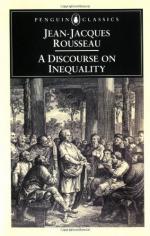
|
| Name: _________________________ | Period: ___________________ |
This quiz consists of 5 multiple choice and 5 short answer questions through Chapter 2, A Discourse on the Moral Effects of the Arts and Sciences, Part II.
Multiple Choice Questions
1. What created ethics according to Rousseau?
(a) Greed.
(b) Pride.
(c) Desire.
(d) Knowledge.
2. What was the result of the arts and sciences becoming despotic, according to Rousseau?
(a) It stifled mans' original liberty and caused people to love their slavery.
(b) The public embraced it.
(c) The public rejected it.
(d) Nothing.
3. What does one have no time to learn when he or she is learning science, according to Rousseau?
(a) Compassion.
(b) Music.
(c) Virtue.
(d) Art.
4. What is Rousseau's biggest worry when discussing the correlation between the restoration of the arts and sciences in?
(a) To not be objective.
(b) It is difficult to treat the subject properly.
(c) To be selective in his research.
(d) That he will not explain it.
5. What has destroyed taste, according to the end of "Chapter 2, A Discourse on the Moral Effects of the Arts and Sciences, Part II"?
(a) Virtue.
(b) Desire.
(c) Art.
(d) Moral corruption.
Short Answer Questions
1. What should society teach men to do instead of pursuing virtue, according to Rousseau?
2. What does Rousseau say wise men do not chase?
3. What does Rousseau believe happens with the more a human knows?
4. Describe what Rousseau felt the following did NOT do for human morals in regard to the arts and sciences.?
5. Who spread knowledge to the masses, according to Rousseau?
|
This section contains 243 words (approx. 1 page at 300 words per page) |

|




